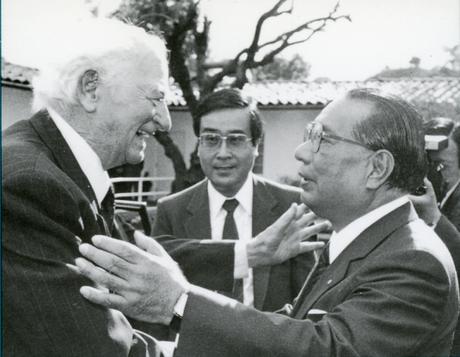
Pauling and Ikeda at Soka University in Los Angeles, 1987
[Part 2 of 2 in a series on Pauling’s interactions with Daisaku Ikeda.]
Linus Pauling’s 1987 meeting with Japanese peace activist Daisaku Ikeda, in which the two discussed their lives and philosophies in great detail, clearly made an impression on both men. Not long after, Ikeda’s assistant, Tomosaburo Hirano, wrote to Pauling again, thanking him for meeting with Ikeda and asking about the possibility of his composing a manuscript for publication in Japan.
Later in 1988, just about a year after their first meeting, Ikeda wrote to Pauling directly to express interest in co-authoring a dialog in order to “provide some suggestion for the young generation who are to shoulder the responsibility in the 21st century, as well as serve the cause of peace and prosperity of humankind.” The dialog would be published in an interview format, based on the transcript of their meeting in Los Angeles and supplemented by additional material. The first step toward completion was for Pauling to answer a series of seventy-three questions regarding his outlook on life. Pauling was interested in the project and promptly responded to the questionnaire.
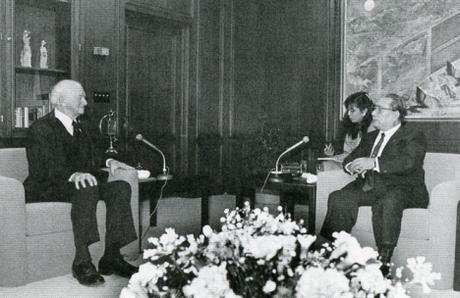
Pauling and Ikeda in dialogue, 1987
Many of the questions developed for the dialog concerned the evolution of Pauling’s views on war and peace over the course of his life. Pauling began by explaining that, as he was only thirteen years old when World War I started, he had few thoughts about international relations at the time. He did recall the conclusion of the war in 1918, as he participated in a victory parade held in Corvallis, Oregon, where he marched alongside other cadets serving in the Oregon Agricultural College Army Reserve Officers Training Corps.
By the dawn of the Second World War, Pauling was well-established in Pasadena, working at the California Institute of Technology. During the war years he directed much of his energy toward projects sponsored by the explosives division of the National Defense Research Committee, where his research was used to support the killing and maiming of enemy soldiers, including the Japanese. Though he would spend much of his life working to limit the amounts of human suffering on Earth, Pauling commented that he felt satisfaction at the conclusion of the war, heartened that Hitler “and his associates” had been denied their goal of gaining control of the planet.
Nonetheless, despite Pauling’s scientific support for the war effort, it was also the case that when J. Robert Oppenheimer asked him to head the Manhattan Project chemistry department at Los Alamos, he refused. Likewise, after the war’s end, it was the emerging development of nuclear weapons and the ongoing threat of nuclear war that prompted Pauling’s peace activism. Over time, this point of view evolved into a desire to eliminate all war from Earth.
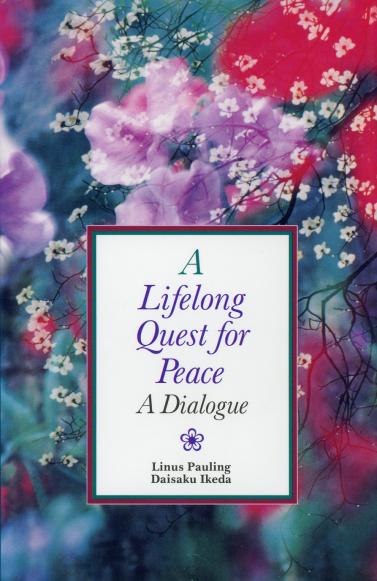
In 1990, the agreement for the Japanese version of the Pauling-Ikeda dialogue, In Quest of the Century of Life, was finalized, and this version of the book was subsequently published. That same year, Pauling delivered a commemorative lecture at the second Soka University Pacific Basin Symposium, held at the Los Angeles campus of Soka Gakkai University.
Pauling used this talk to reflect on the genesis of his peace activism in some detail. Pauling recalled that, following the detonation of nuclear bombs over Hiroshima and Nagasaki in 1945, the public first became aware of the existence of nuclear weapons. In short order, businessmen’s clubs and other civic groups began to request that Pauling deliver after-dinner talks on the nature of these powerful new weapons. The talks were meant to be purely educational, according to Pauling, and focused mostly on the nature of atomic nuclei and nuclear energy.
Pauling soon discovered however, that as he gave more talks of this kind, he found himself ending them with a short commentary on war in general. In these, he expressed his hope that the existence of nuclear weapons would act as a deterrent to future conflicts, which would instead be handled by an international system of law. Albert Einstein had conveyed a similar sentiment as early as 1946.
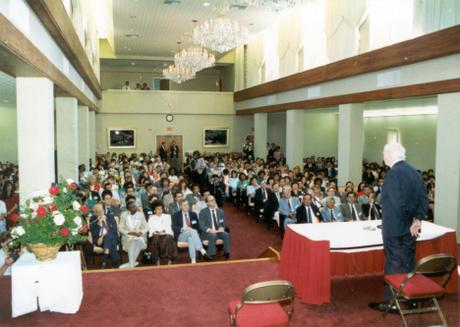
Pauling speaking at Soka University, August 24, 1990.
But with the passage of time, as nuclear stockpiles grew and the magnitude of the bombs being produced increased from 20 kilotons to 20 megatons – more than a thousand times more powerful than the weapons used in Japan – Pauling and many others began to call for global disarmament. While this directive was partially heeded the world’s governments, many large militaries began looking for ways to profit on their slow but steady draw down in arms. As Pauling pointed out, this ambition led to sales of military surplus.
“What do we have going on in the world now?” Pauling queried at the podium.
Wars, a lot of wars. And thousands, tens of thousands of people killed every year in wars…And what does the United States do, and the Soviet Union do, and the Chinese People’s Republic? They all sell advanced military weapons to other countries, the underdeveloped countries, countries that have a lot of money because of oil.
Pauling’s rhetoric had sharpened over the years, and now, before a packed house in Los Angeles, he demanded a change from the military-industrial status quo that had emerged in the wake of the Second World War.
Now we are forced to eliminate from the world forever the vestige of prehistoric barbarism, this curse of the human race, war. We, you and I, are privileged to live at a time in the world’s history, this remarkable extraordinary age, the unique epoch in this history of the world, the epoch of demarcation between the past millennia of war and suffering and the future, the great future of peace, justice, morality, and human well-being. The world community will thereby be freed, not only from the suffering caused by war, but also from hunger, disease, and fear through the better use of the earth’s resources, the discoveries made by scientists and the efforts of human beings through their work. And I am confident that we shall, in the course of time, build a world characterized by economic, political and social justice for all persons and a culture worthy of man’s intelligence.
In 1991, the year following Pauling’s Soka University address, Linus Pauling and Daisaku Ikeda, along with Johan Galtung, the Norwegian founder of the discipline of Peace and Conflict Studies, signed the Oslo Appeal. This document urged the United Nations to require that nuclear member states issue a global, joint Nuclear Test Ban Treaty as well as a Nuclear Non-Proliferation Treaty; outlaw the production and stockpiling of chemical and biological weapons; prohibit the international weapons trade; and sponsor an international conference to discuss the redirection of resources released through disarmament to support development in the Third World.
Subsequently, Linus Pauling received the Daisaku Ikeda Medal for Peace, awarded by Soka Gakkai International in 1992. Later that year, the English translation of his and Ikeda’s dialog was published in the West under the title of A Lifelong Quest for Peace.
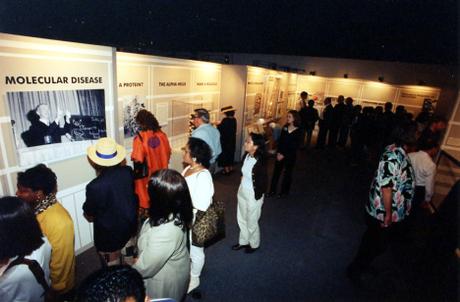
Visitors at the San Francisco opening of the “Linus Pauling and the Twentieth Century” exhibit, 1998.
Following Pauling’s death in 1994, Ikeda expressed a desire to honor his friend with a travelling exhibition that would be funded by Soka Gakkai’s resources. The exhibition was initially conceived of as a means for educating the public on ideas in chemistry and as a mechanism for introducing children to Pauling as a role model.
As it moved forward, the exhibit shifted toward honoring all facets of Pauling’s career as a humanitarian, activist, scientist, and medical researcher. Once finalized, the exhibit toured the world for six years. Millions of people saw it in Europe and Japan, as well as multiple locations in the United States, including Washington D.C., San Francisco, Boston, and Pauling’s birthplace, Portland, Oregon.
Advertisements